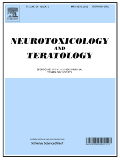
NEUROTOXICOLOGY AND TERATOLOGY
Scope & Guideline
Empowering researchers with vital knowledge in neurotoxicology.
Introduction
Aims and Scopes
- Developmental Neurotoxicity:
Research on how various chemical exposures during critical periods of development (e.g., pregnancy, early childhood) lead to neurotoxic effects, including cognitive, behavioral, and motor deficits. - Teratogenic Effects of Substances:
Investigation of the effects of drugs, environmental pollutants, and other substances on congenital malformations and neurodevelopmental disorders. - Psychosocial Stressors:
Exploration of how maternal stress, mental health, and socioeconomic factors influence fetal and child neurodevelopment. - Animal Models and Experimental Studies:
Utilization of various animal models (e.g., zebrafish, rodents) to study the mechanisms and pathways through which developmental exposures lead to neurobehavioral changes. - Epidemiological and Cohort Studies:
Analysis of human cohort data to understand the relationships between prenatal exposures and long-term neurodevelopmental outcomes. - Policy and Regulatory Issues:
Discussion on regulatory requirements and public health implications related to developmental neurotoxicology and teratology.
Trending and Emerging
- Impact of Emerging Contaminants:
Increased research on the effects of emerging contaminants such as PFAS (per- and polyfluoroalkyl substances) and their neurodevelopmental impacts, highlighting growing environmental concerns. - Multisubstance Exposure Research:
A trend towards studying the effects of combined exposures to multiple substances (e.g., tobacco, cannabis, alcohol) during critical developmental windows, reflecting real-world co-use patterns. - AI and Computational Approaches:
Emerging use of artificial intelligence and machine learning techniques for screening and assessing developmental toxicity, indicating a technological advancement in research methodologies. - Intergenerational Effects of Exposure:
Growing interest in understanding how prenatal exposures affect not just the immediate offspring but also subsequent generations, emphasizing the long-term ramifications of toxic exposures. - Psychosocial and Environmental Interactions:
An increasing emphasis on how psychosocial factors interact with chemical exposures to influence neurodevelopmental outcomes, reflecting a more holistic approach to research.
Declining or Waning
- Traditional Pharmacological Studies:
Research focusing solely on the pharmacological effects of medications on development has decreased, potentially due to a shift toward understanding complex interactions of substances and environmental factors. - Single-Agent Exposure Studies:
There is a noticeable decline in studies examining the effects of single chemical exposures, as the field increasingly recognizes the importance of studying mixtures and cumulative exposures. - Non-Experimental Observational Studies:
There has been a reduction in non-experimental studies that do not employ robust methodologies, as the field moves towards more rigorous experimental designs and mechanistic investigations. - Focus on Adult Neurotoxicity:
Research concentrating on neurotoxic effects in adult populations is waning, reflecting a stronger emphasis on developmental stages and their long-term implications.
Similar Journals

Journal of Developmental Origins of Health and Disease
Illuminating the Path from Development to WellnessThe Journal of Developmental Origins of Health and Disease is a premier academic publication under the esteemed Cambridge University Press, dedicated to advancing the understanding of how developmental processes influence health outcomes across the lifespan. With an ISSN of 2040-1744 and an E-ISSN of 2040-1752, this journal has established itself as a critical resource in the field of medicine, currently positioned in the Q2 category of Medicine (miscellaneous). Having converged from 2010 to 2024, this journal reflects a significant commitment to exploring the interconnections between early development and subsequent health conditions. Ranked 147 out of 398 in its category according to Scopus, it retains a commendable 63rd percentile status, highlighting its contributions to this rapidly evolving field. Though it does not offer open access, the journal remains a vital platform for researchers, professionals, and students interested in uncovering the intricate links between developmental biology and public health challenges.

INTERNATIONAL JOURNAL OF DEVELOPMENTAL NEUROSCIENCE
Elevating Academic Discourse in Developmental NeuroscienceThe INTERNATIONAL JOURNAL OF DEVELOPMENTAL NEUROSCIENCE is a critical platform for disseminating cutting-edge research in the field of developmental biology and neuroscience. Published by WILEY, this esteemed journal has been contributing to the academic community since its inception in 1983, and continues to serve as a vital resource through to 2024. With an impact factor that reflects its influence in the field—ranking in Q3 for both Developmental Biology and Developmental Neuroscience—this journal presents an opportunity for researchers, professionals, and students alike to engage with pioneering studies and extend their understanding of complex developmental processes. Although not open access, the journal provides an essential repository of knowledge for those seeking to explore the nuances of neurological development and related disciplines. It actively supports academic discourse and research dissemination, thereby playing a significant role in advancing our collective understanding of developmental neuroscience.

JOURNAL OF DEVELOPMENTAL AND BEHAVIORAL PEDIATRICS
Connecting disciplines to foster developmental success.JOURNAL OF DEVELOPMENTAL AND BEHAVIORAL PEDIATRICS, published by Lippincott Williams & Wilkins, stands as a pivotal platform for interdisciplinary research in the fields of pediatrics, psychology, and mental health. Established in 1980 and with a comprehensive coverage extending to 2024, this esteemed journal operates within the realms of developmental and educational psychology, medicine, and psychiatry, earning a commendable Q2 ranking in its respective categories as of 2023. Its overarching objective is to disseminate high-quality, peer-reviewed studies that address the intricate interplay between developmental milestones and behavioral health in children. Although it does not currently offer open access, the journal's influential presence in the scholarly community is underscored by its strategic positioning within the Scopus rankings, making it an invaluable resource for researchers, practitioners, and students committed to advancing the health and well-being of children and adolescents.

COMPARATIVE BIOCHEMISTRY AND PHYSIOLOGY C-TOXICOLOGY & PHARMACOLOGY
Advancing Knowledge in Biochemical Toxicology and PharmacologyComparative Biochemistry and Physiology C-Toxicology & Pharmacology, published by Elsevier Science Inc, stands as a prominent resource in the fields of pharmacology, toxicology, and biochemical research. With its ISSN 1532-0456 and E-ISSN 1878-1659, this journal has carved out a significant niche, focusing on the comparative aspects of biochemical and physiological data across various species. Recognized for its impact in diverse fields, it boasts a Q1 ranking in Animal Science and Zoology, Aquatic Science, Health, Toxicology and Mutagenesis, alongside respectable standings in other related disciplines. Researchers and professionals can leverage this publication to access high-quality, peer-reviewed studies that advance the understanding of biochemical processes and their toxicological implications. The journal aims to bridge the gap between laboratory findings and real-world applications, fostering an environment for interdisciplinary collaboration. For academics seeking to enhance their knowledge or contribute to this impactful field, Comparative Biochemistry and Physiology C-Toxicology & Pharmacology serves as an invaluable platform.

DEVELOPMENTAL NEUROPSYCHOLOGY
Fostering Dialogue for Evolving Neuropsychological PracticesDEVELOPMENTAL NEUROPSYCHOLOGY (ISSN: 8756-5641; E-ISSN: 1532-6942) is a pivotal peer-reviewed journal published by ROUTLEDGE JOURNALS, TAYLOR & FRANCIS LTD in the United Kingdom. Since its inception in 1985, this esteemed journal has been dedicated to advancing the understanding of developmental processes that influence neuropsychological outcomes in children and adolescents. With a focus on the integration of psychological and neuropsychological perspectives, it serves as a vital resource for researchers, clinicians, and educators alike. The journal's current impact factor and its placement in the third quartile for both Developmental and Educational Psychology and Neuropsychology categories underscore its significance in the field, as it ranks in the 45th percentile in both Scopus ranks. While DEVELOPMENTAL NEUROPSYCHOLOGY does not offer open access, it presents crucial research findings and theoretical advancements that cater to professionals seeking to deepen their knowledge and application of developmental neuropsychology until 2024. By fostering dialogue among scholars and practitioners, this journal contributes meaningfully to the ongoing evolution of clinical practices and educational strategies targeting neurodevelopmental trajectories.

NEUROTOXICOLOGY
Elevating Understanding in NeurotoxicologyNEUROTOXICOLOGY, published by Elsevier, stands at the forefront of research in the disciplines of neuroscience and toxicology, contributing significantly to the understanding of neurotoxic effects and their implications for health. With an impact factor positioned within the second quartile in both neuroscience and toxicology categories, this journal has established itself as a crucial platform for disseminating high-quality research findings and innovative methodologies. Since its inception in 1979 and continuing through 2024, NEUROTOXICOLOGY has provided valuable insights and evidence-based studies that facilitate advancements in the fields of pharmacology and neuroscience, making it a pivotal resource for researchers, professionals, and students alike. Although not an open-access publication, it offers extensive access options ensuring wide dissemination of knowledge. Located in the Netherlands, the journal’s continued commitment to excellence is evident through its high rankings in Scopus, reflecting its prominence and relevance in the scientific community.

ARCHIVES OF TOXICOLOGY
Transforming Knowledge into Public Health SolutionsARCHIVES OF TOXICOLOGY is a prestigious journal published by Springer Heidelberg, dedicated to advancing research in the field of toxicology and related disciplines. With a distinguished history dating back to 1930, this journal has continuously provided vital insights and groundbreaking studies, making it a cornerstone in the areas of health, toxicology, and medicine. Recognized for its high impact, it occupies a top-ranking position in Scopus, with remarkable quartile placements in 2023, categorizing it as Q1 in Health, Toxicology and Mutagenesis, and Q1 in Medicine (Miscellaneous). The journal highlights critical research and innovative methodologies, appealing to a diverse audience of researchers, professionals, and students committed to understanding the complexities of toxic substances and their implications for public health and environmental safety. The journal does not currently offer open access, allowing for a more traditional but rigorous peer-review process that ensures the quality and integrity of every published article. Join the global discourse in toxicological science with ARCHIVES OF TOXICOLOGY, where every contribution furthers the understanding of safety and toxicity in our world.

DEVELOPMENTAL NEUROSCIENCE
Exploring the Complexities of NeurodevelopmentDEVELOPMENTAL NEUROSCIENCE, published by KARGER, is a vital academic journal dedicated to advancing the field of neurodevelopmental research. Since its inception in 1978, this journal has been instrumental in disseminating high-quality studies that explore the complexities of brain development and function throughout the lifespan. With an impact factor that places it in the second quartile (Q2) of Developmental Neuroscience and Neurology categories, it ranks among the top publications in its field, offering valuable insights for researchers, clinicians, and students alike. Though primarily subscription-based, the journal remains committed to fostering academic discourse and collaboration through its extensive repository of original research articles, reviews, and case studies. The journal is located at ALLSCHWILERSTRASSE 10, CH-4009 BASEL, SWITZERLAND, and its scope spans critical areas of inquiry within developmental neurology, providing a platform for emerging ideas and methodologies. As such, DEVELOPMENTAL NEUROSCIENCE serves not only as a critical resource for seasoned professionals but also as an enriching educational tool for the next generation of neuroscientists.

Molecular Autism
Exploring the genetic landscape of autism spectrum disorders.Molecular Autism, published by BMC in the United Kingdom, is a premier open-access journal dedicated to publishing high-quality research on the molecular and genetic factors contributing to autism spectrum disorders. Since its inception in 2010, the journal has established itself as a vital resource for researchers and clinicians, offering insights into the developmental biology, neuroscience, and psychiatric dimensions of autism. With an impressive impact factor and rankings placing it in the Q1 category across multiple relevant fields such as Developmental Biology, Developmental Neuroscience, Molecular Biology, and Psychiatry and Mental Health, it serves as a critical platform for the dissemination of innovative research and interdisciplinary collaboration. The journal encourages open dialogue through its commitment to making research freely accessible, thereby advancing knowledge and fostering advances in the understanding of autism. By bridging diverse disciplines and engaging with cutting-edge research, Molecular Autism aims to enhance our understanding of autism's complexities and inform future therapeutic approaches.

DRUG AND CHEMICAL TOXICOLOGY
Illuminating the path to chemical health and safety.Drug and Chemical Toxicology is a well-respected journal in the fields of toxicology, pharmacology, and public health, published by Taylor & Francis Ltd. Since its inception in 1978, this journal has diligently explored the effects and mechanisms of chemical exposures on health and the environment, fulfilling a crucial role in advancing scientific understanding and safeguarding public health. The journal is indexed across prestigious databases and features an impressive array of articles categorized within the Q2 and Q3 quartiles across various categories in 2023, reflecting its significance in Chemical Health and Safety as well as Environmental and Occupational Health disciplines. With an extensive reach and a focus on interdisciplinary research, Drug and Chemical Toxicology offers a rich repository of original research, reviews, and methodological advancements, catering to a diverse audience of researchers, professionals, and students dedicated to the betterment of safety and health standards. Although not an open-access publication, its articles are widely accessible to the academic community, ensuring that critical innovations and insights are shared for the greater good.